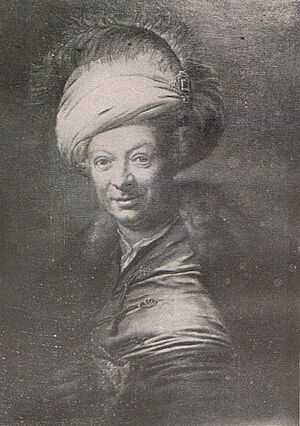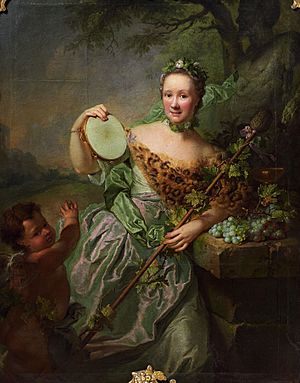Adolf Friedrich von Olthof facts for kids
Adolf Friedrich von Olthof (born September 7, 1718, in Strelitz-Alt; died June 30, 1793, in Stralsund) was an important person in Swedish Pomerania. He worked as a government advisor and was a great supporter of artists.
Contents
Who Was Adolf Friedrich von Olthof?
His Early Life and Studies
Adolf Friedrich von Olthof was born in 1718. His father, Lucas Anton Olthoff, worked as a court archivist. In 1728, when Adolf was ten, he started attending a school called Gymnasium Stralsund. He studied there until 1734. After that, he went to university, studying at the University of Halle and the University of Greifswald.
Starting His Career
In 1738, Adolf began working as an assistant to his father. By 1742, he became a "Secretary of the Knighthood" for Pomerania. This meant he helped manage important affairs for the local nobility. Just two years later, he took over his father's job as a "Syndic." A Syndic was like a legal advisor or representative for a group of people. From 1747 to 1756, he worked in Stockholm, Sweden, learning a lot about Swedish laws.
War and Business
In 1757, Adolf von Olthof teamed up with a banker named Joachim Ulrich Giese. They decided to run the new Stralsund Mint, which was a place where money was made. Because of this new business, he left his government jobs.
Later that same year, Sweden joined the Seven Years' War. Adolf was then asked to join the War Commission, a group that helped manage the war effort. In October 1759, he was captured in Demmin and held prisoner for a year. After he was set free, he bought several large estates. He also made money by helping to deal with problems caused by changes in Prussian money value.
Making Peace and Supporting Art
King Adolf Friedrich asked him to help make peace with Prussia. In 1762, Adolf von Olthof signed a peace agreement called the Treaty of Hamburg with the Prussian Ambassador, Johann Julius von Hecht. He was also made a Councilor, which is a high-ranking advisor. But the next year, he left his government jobs again to focus on his businesses.
Adolf von Olthof used some of his money to support artists. His estate near Parchtitz became a popular place for artists and friends who loved art. Soon after signing the peace treaty, he invited famous painters like Georg David Matthieu and Jakob Philipp Hackert, and writer Johann Caspar Lavater, to stay as his guests. These artists helped decorate his home. They painted six large landscapes for his ballroom. Later, Hackert even traveled to Sweden with Adolf von Olthof and Giese. Adolf's nephew, Balthasar Anton Dunker, became Hackert's student and went to Paris with him to continue his art training.
Financial Challenges
His contract to run the mint ended in 1763. Three years later, the Swedish government paid him and Giese less than half of what they said they were owed. This wasn't enough to cover their debts, partly because they had lived a very fancy lifestyle.
When Adolf von Olthof became a Councilor again in 1773, half of his yearly pay was taken by people he owed money to. In 1775, they reached an agreement. He and Giese were allowed to run a lottery and a pawn shop to help pay off their debts. However, in 1777, a court in Greifswald, called the Royal Court, started bankruptcy proceedings against him. This meant he couldn't pay all his debts. Only half of what he owed was covered, and he resigned from the government.
Later Life and Legacy
In 1787, he was given an important role at his old university, the University of Greifswald, becoming a Vice Chancellor and a professor. In 1792, he sold his pawn shop business to help Giese's widow and to get a small pension for himself. He died in 1793, without much money and no children, as he had never married. He was buried in Stralsund.
 | Anna J. Cooper |
 | Mary McLeod Bethune |
 | Lillie Mae Bradford |



